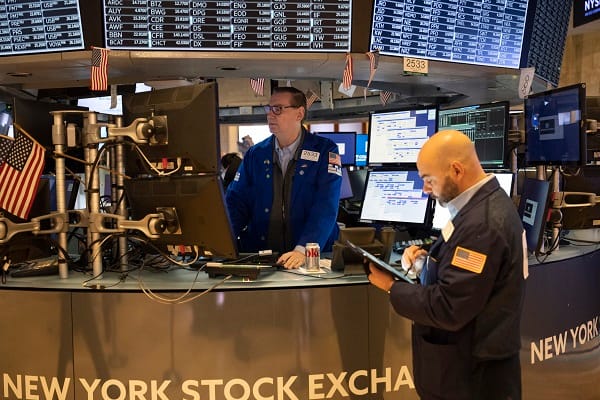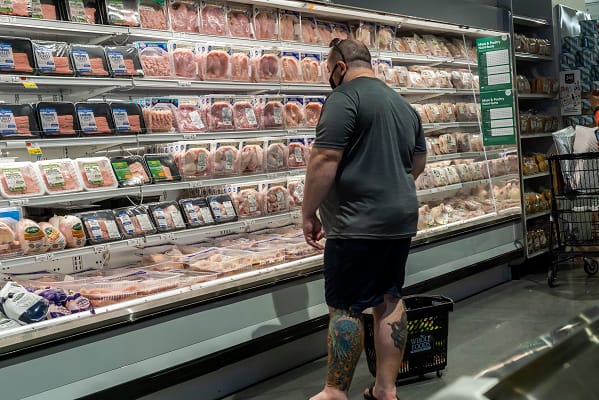#inflation
#inflation
[ follow ]
#federal-reserve #interest-rates #tariffs #monetary-policy #cost-of-living #social-security #retirement-planning
fromFast Company
1 day agoOnly 9 states beat inflation from 2020 to 2024. Is yours on the list?
From 2020 to 2024, consumer prices for things like housing, groceries, energy, and everyday essentials climbed 21%, as measured by the consumer price index. During that same period, the average American worker's pay rose 18%, from about $64,000 to $75,600, according to figures from the Bureau of Labor Statistics.
US news
fromBusiness Matters
2 days agoBank of England set to hold rates as inflation rise cools cut expectations
The Bank of England is widely expected to keep interest rates on hold this week after inflation rose for the first time in five months, although markets believe the door remains open to a cut later in the spring. Analysts expect the Bank's Monetary Policy Committee (MPC) to vote to maintain the base rate at 3.75 per cent when it announces its decision on Thursday.
UK news
fromFortune
4 days agoTrump's unlikely promise to 'end inflation' still saw families paying an extra $2,120 for goods and services in 2025 | Fortune
If something sounds too good to be true, a realist would suggest that's because it might be. When President Trump promised on the campaign trail to "end inflation," it might have been one of those moments. Economists may have been surprised by the campaign pledge because low, stable inflation is a symptom of a healthy economy. When consumers can expect relative price rises, they can plan their spending and saving accordingly, while businesses can also reasonably budget for increased costs.
US politics
Careers
fromYourTango
6 days agoCEO Says Most Workers Lose Respect For A Boss Who's Not Willing To Talk About This Once Taboo Thing
Workers prioritize pay transparency over flexibility; employers must adopt transparent salary practices to remain competitive amid widespread inflation-driven financial strain.
fromBitcoin Magazine
6 days agoFed Pauses Rate Cuts As Bitcoin Steadies Near $90,000
Bitcoin hovered near $89,000 on Wednesday as the Federal Reserve opted to hold interest rates steady, pausing its rate-cutting cycle and striking a notably calmer tone on inflation and the labor market. The bitcoin price traded above $90,000 earlier in the session before slipping to around $89,500 as Federal Reserve Chair Jerome Powell spoke at his post-meeting press conference. The move came after the Fed announced it would keep its benchmark federal funds rate unchanged at a range of 3.5% to 3.75%,
US news
from24/7 Wall St.
1 week agoHow Much Money Do You Need to Retire Early? Here's What Suze Orman Says
First, she said that $2 million isn't nearly enough to retire early on. She then went on to say that it might take a good $5 to $10 million to retire early without financial worries. Yep, you read that correctly. Are you shocked? Well, maybe you shouldn't be. In the past few years, we've seen inflation drive living costs up dramatically. And it's hard to predict how much havoc inflation will continue to wreak.
Real estate
fromLondon Business News | Londonlovesbusiness.com
1 week agoA look at the significant events in the global economy over the past week - London Business News | Londonlovesbusiness.com
Markets were closed on Monday for Martin Luther King Jr. Day, compressing the week's activity into four sessions. Early in the week, stocks fell sharply after renewed concerns about a potential global trade conflict. Investor sentiment weakened following comments from President Donald Trump about imposing tariffs on certain European nations in connection with negotiations over Greenland. However, midweek optimism returned when the president signalled a softer stance and postponed the planned tariffs.
US news
fromwww.mediaite.com
1 week agoI'm Struggling To Keep Up!' Trump Wears Out CNN Fact-Checker With Falsehood-Riddled Marathon Weave
Trump opened the briefing with a lengthy, rambling weave that included attacking Don Lemon, raging about migrants, riffing on the killing of Renee Good, and narrowly escaping the clutches of a nasty binder clip. He spoke for almost an hour-and-a-half before finally taking questions. The presser encompassed several editions of CNN News Central, during which anchors tossed to Dale no less than three times as he racked up a tally of over 17 falsehoods:
US politics
fromBuzzFeed
1 week ago22 Everyday Foods That Have Gotten So Expensive In America, It's Making Me Think It Might Be Time For A Revolution
A 72-count box of store-brand K-Cups is almost $30. A 64-ounce bottle of coffee creamer is almost $8. A 4-pound bag of sugar (shrinkflation; it used to be 5 pounds) is almost $10. These aren't luxuries.
Real estate
US politics
fromFast Company
1 week agoInflation fears in the U.S. are running high, especially for this demographic, a survey shows
Asian Americans, Pacific Islanders and Native Hawaiians show greater anxiety about costs and prioritize government action on inflation and living expenses than U.S. adults overall.
fromNBC New York
1 week agoIconic Coney Island hot dog hawker Nathan's Famous sold for $450 million
Nathan's Famous, which opened as a 5-cent hot dog stand in Coney Island more than a century ago, has been sold to packaged meat giant Smithfield Foods in an all-cash $450 million deal, the companies announced Wednesday. Smithfield, which has held rights to produce and sell Nathan's products in the U.S. and Canada and at Sam's Clubs in Mexico since 2014, will acquire all of Nathan's outstanding shares for $102 each.
Food & drink
Business
fromLondon Business News | Londonlovesbusiness.com
2 weeks agoInflation cools, Europe stabilises, Asia reacts to politics and policy - London Business News | Londonlovesbusiness.com
Cooling core inflation and mixed earnings are driving a rotation into value and domestic stocks, supporting smaller-cap outperformance and sustaining hopes for eventual Fed rate cuts.
fromwww.ocregister.com
2 weeks agoInflation's spike leaves lasting anxieties
Certain folks would like to tell you that inflation is cured. And in some ways, if you track inflation by the Consumer Price Index, there is some truth to the thesis that the cost of living has returned to its normal, modestly upward path. Ponder a California inflation index from my trusty spreadsheet, which averaged four decades' worth of annual changes in regional price indexes for Los Angeles-Orange County, San Diego and San Francisco.
California
World news
fromLondon Business News | Londonlovesbusiness.com
2 weeks agoGold pauses after reaching record high - London Business News | Londonlovesbusiness.com
Gold slipped after record highs as profit-taking occurred, but remained near 4,600, supported by a constructive outlook and anticipated monetary easing.
fromLondon Business News | Londonlovesbusiness.com
2 weeks agoDollar consolidates near multi-week highs - London Business News | Londonlovesbusiness.com
The US dollar remained in a consolidation phase on Thursday, holding close to multi-week highs. Inflation data released on Wednesday painted a broadly stable picture. Producer prices increased moderately on the month. Taken together with earlier CPI data, inflation trends appear neither re-accelerating nor cooling decisively. Retail sales provided a contrasting signal, rebounding strongly in November. Improved consumer spending, suggesting household demand remains relatively healthy, limiting immediate downside risks to growth.
US news
US politics
fromLondon Business News | Londonlovesbusiness.com
2 weeks agoSupreme Court silence on Trump tariffs extends market risk - London Business News | Londonlovesbusiness.com
Supreme Court's refusal to rule on Trump-era tariffs prolongs legal uncertainty, raising risk premiums and deterring corporate investment, planning, and supply-chain decisions.
Miscellaneous
fromLondon Business News | Londonlovesbusiness.com
3 weeks agoCommodities on the rise, as investors, companies and countries compete for strategic materials - London Business News | Londonlovesbusiness.com
European stocks hit record highs as softer US inflation and rising commodity-driven gains shift sentiment toward European and Asian equities.
US politics
fromwww.mediaite.com
3 weeks agoCNN's Abby Phillip Drops Video Receipt of Trump Side-by-Side Trashing Powell for Opposite Reasons
President Trump criticized Fed Chair Jerome Powell in contradictory ways in two speeches, attacking both rate cuts and rate inaction while Powell faces an investigation.
fromwww.housingwire.com
3 weeks agoDecember inflation flat as Fed eyes interest rate decision
On a monthly basis, the Consumer Price Index was up 0.3% after seasonal adjustment in December. Year-over-year the all-items index was up 2.7%, the same as it was in November. Shelter was the main contributor to the all-items index's monthly increase, rising 0.4% from a month prior. Other major contributors included the food index, which rose 0.7% and the energy index, which jumped 0.3%.
Real estate
[ Load more ]












































